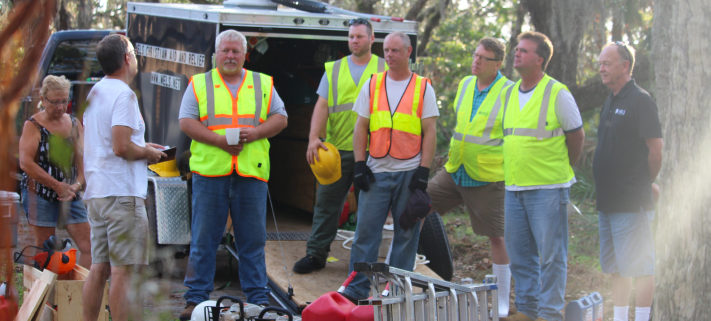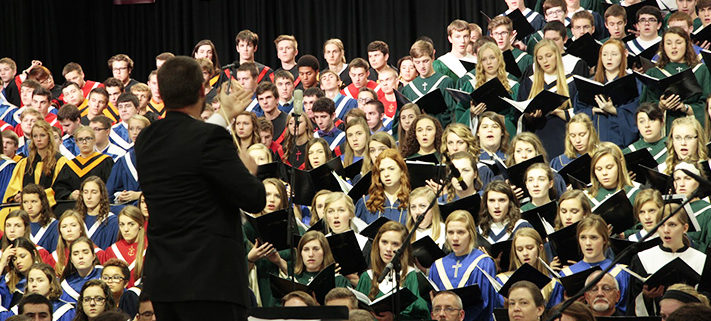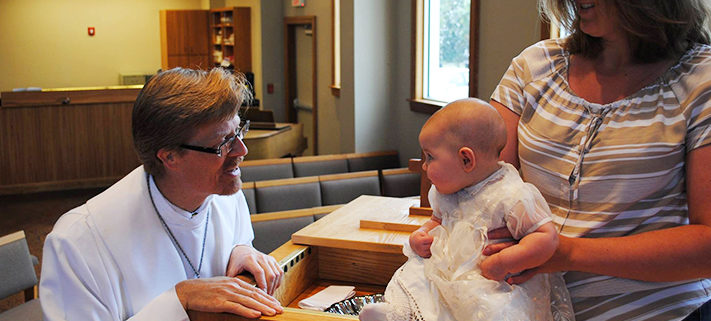“Joyful. Exciting. Amazing. A taste of heaven.” These are just some of the words used to describe the WELS National Choral Festival which celebrates its fiftieth anniversary November 10-12, in La Crosse, Wisconsin–the place where it all began.
“Choral Fest allowed my choir family to grow along with my faith…We all stood together as one in faith and in song.” Shelby Cary, Luther High School
Luther High School, Onalaska, has a long tradition of musical excellence. Frank J. Italiano directed the Luther High School band for many years. It was an outstanding group and popular with the students. “Of the 60 kids in the school, 59 were in band,” recalls Dave Adickes, who inherited the Luther choral program early in his ministry. Italiano held the first Lutheran band festival at Luther in 1960 and Adickes thought, “We should do the same!” He dreamed big, calling it the National Lutheran Choral Festival and inviting eight WELS prep and high schools to sing in the first festival. Nearly 300 students gathered to “celebrate God’s gift of music” and get a “sneak peek of heaven” as well as gain exposure to a wide variety of directors and techniques. (D)MLC’s head of choral music, Professor Martin Albrecht, directed the mass choir, which fulfilled another objective–getting students to “love DMLC,” according to Adickes. From the beginning, Friday night’s concert was a secular concert performed by the individual choirs in which “everyone cheered for everyone.” Saturday was a day of rehearsal and fun, culminating with Sunday’s mass sacred concert. The location of Choral Fest changed as various WELS high schools hosted the event. Traveling to Choral Fest was “exciting for the kids and us.”
“Some of the non-musical activities make Choral Fest Choral Fest even more than the singing! These are often the most memorable, along with praising God with our talents for a whole weekend.” Cameron Schroeder, Luther High School
As the years went on, changes to Choral Fest included specialized clinicians, regional and national festivals held in alternate years with up to 21 high schools participating. In 1982, the 25th anniversary of Choral Fest, Adickes again hosted the gathering at Luther High School. This was the first time a special piece was commissioned for the festival, a tradition which has continued throughout the years. Adickes says it’s “great to see how [Choral Fest] has grown and how the directors have grown and how much the quality of the music has improved.” Choral Fest has “helped unite the schools and bring the congregations together” as students, directors, families and friends meet new people and enjoy God’s wonderful gift of music together. Choral Festival continues “to do what we hoped it would do from the beginning,” says Adickes.
“My kids love Choral Fest. They make new friends, they are exposed to the directing styles of different directors, and they always express the deep joy they experience from singing beautiful music to God’s glory with fellow Christians. As a teacher and director, what more could I want for them?” Ned Goede, WISCO
As Choral Festival celebrates its fiftieth anniversary, Luther High School will again serve as host, this time under the direction of Dave Adickes’ son, Paul. Paul Adickes, former Choral Festival attendee, director, clinician and previous host, says “it’s really exciting for me to be hosting the 50th anniversary right here in the Coulee Region where it all started. Each Festival has been a unique and wonderful experience for me and my students.”
This year’s festival will be held at the La Crosse Center with “plenty of seating for everyone,” according to the younger Adickes. Music from the past five decades, an alumni choir and commissioned works by Sarah Siegler and Dale Witte, including the final piece, an arrangement of “God’s Word Is Our Great Heritage,” which also serves as this year’s theme, are highlights of the anniversary. The image of the Mississippi River Bridge, “an iconic feature in La Crosse,” adorns the posters, symbolizing how “Choral Festival 2017 will bridge the music of the past, present and future with the timeless heritage and hope that we have in the living and enduring Word of God,” says Paul Adickes.
“I feel honored to be able to play at Choral Festival this year…Choral Fest honestly played a huge part in inspiring me to become a music teacher. I knew that someday I wanted to be able to lead students to praise God and witness together just like my grandfather and father have.” Jennifer Adickes, MLC
Paul Adickes continues, “Choral Festival has endured for so many reasons beyond its musical value…The friendships that are created, the bonds of faith that are reinforced, and the words of faith proclaimed in song resonate in the hearts of our students long after the concerts. Choral Festival gives them an experience that is a lifelong blessing.”
Please visit www.welsfinearts.org for more information about Choral Festival 2017, to register for the alumni choir or view a livestream of the secular and sacred concerts.
How God has blessed 50 years of the National Lutheran Choral Festival! From founder to director, present to past Choral Festival participants, so many had so much to say about their amazing experiences. Read on for a wonderful listing of God’s grace through his gift of music to these individuals and know that the blessings were multiplied many times over in the thousands of participants and listeners over the years. To God be the glory!
MORE INTERVIEWS
Dave Adickes, retired teacher, Luther High School, Onalaska, Wis., and founder of the WELS National Lutheran Choral Festival:
Dave Adickes recalls taking the choir for Luther High School to Choral Festival in Arizona with a side trip to the Grand Canyon. “We tried to sing at a chapel on a promontory overlooking the canyon,” he says. “We sang but were kicked out, so we sang outside.”
Paul Adickes, teacher, Luther High School, Onalaska, Wis.:
“I remember how exciting it was to be in Phoenix as a student, seeing the desert, and meeting fellow WELS students from all over the country. This was my first experience in a choir that large. It was amazing to hear that many voices singing together, praising God.”
“I remember our coach bus getting stuck in the mountains at 12,000 feet while traveling to a Festival, and doing the Macarena with Lakeside’s choir on Interstate 80 somewhere in Nebraska.”
“I remember the wonderful weekends I spent becoming friends with my fellow WELS choral directors, and I remember how much I have learned from them over the years.”
“As a director, I remember several times being so moved that I was unable to sing during the sacred concert. The impact of hundreds of young people proclaiming their faith in song with such conviction is unlike anything else.”
“As a clinician, I remember how humbling it is to stand in front of so many talented young people and to work with them. To be able to talk about our common faith, how it ties into the words and music and how the Holy Spirit would use that to reach the audience.”
“Growing up, I always looked forward to Choral Festival, and I knew how much it meant to my father when he was directing. I sat in the audience for many Choral Festivals long before I was ever in high school. I guess I caught that passion from my father.”
“I strongly believe that as long as we value music as one of God’s greatest gifts to mankind, there will be a Choral Festival. The next generation of musicians coming out of our WELS colleges is well prepared to take Choral Festival into a very bright future. Lord willing, I look forward to attending the 75th anniversary of Choral Festival!”
Ned Goede, teacher, Wisconsin Lutheran High School, Milwaukee, Wis.:
“I did attend the first Choral Festival at Onalaska Luther in the fall of 1967. I was a senior at Luther Academy in New Ulm. Our music professor, Eldon Hirsch, selected 12 seniors to represent the school at this festival. We rehearsed in the evening right after football and other practices and didn’t have time to shower. So we began calling ourselves the ‘Dirty Dozen’ after a famous movie at that time I still think of that group as the ‘Dirty Dozen.’”
“The first Choral Fest secular concert (now called the Pops Concert) was a madrigal concert with each group singing one madrigal and one secular piece. There were no microphones and definitely no dancing. It’s very different today with each group doing specialized choreography and having sound and light options.”
“I remember that the singers were packed in like sardines for the sacred concert, but we had fun and friendships that continued for many years afterward.”
“Hosting the 40th anniversary at Wisco was a personally joyous and satisfying experience for me. But, the memory that will most be with me is watching these wonderful young men and women sing beautiful songs of faith from hearts of faith. I get emotional every year as I experience this.”
“I never thought that I would be a part of the Choral Fest experience. I actually was not even sure I wanted to go into ministry at that time. So thankful the Lord guided me to choose ministry. (This is my 48th year in ministry.)”
Cameron Schroeder, student, Luther High School, Onalaska, Wis.:
“I love getting to meet students from other schools that are so similar to mine. We are from pretty much the same world, and now those different parts of WELS collide in one spot, and it’s a blast! I’m also very musical and so getting to sing in a choir of this size is a HUGE privilege that not too many people get to have. It’s a ton of fun!”
“Last year, it was a free period between group rehearsals, and my friend and I wanted to meet people from other schools, so we both sat in office chairs with wheels that we found in our meeting room and then wheeled around the hallways, visiting other rooms and saying hi. Some of the non-musical activities make Choral Fest Choral Fest, even more than the singing! These are often the most memorable, along with praising God with our talents for the whole weekend.”
Shelby Cary, student, Luther High School, Onalaska, Wis.:
“Last year, I attended Choral Fest for the first time with virtually no expectations on what it would be like. I traveled with my show choir from Wisconsin to Nebraska in a bus. Upon arriving at Choral Fest, I realized that this would be an experience unlike any I had ever had. The atmosphere was fun, inviting, Christian-based, and we all got the opportunity to connect with students from around the country. We all had the same goal in mind: to work hard and do our best to praise God with this very special event. It was so incredible to work with the talented musicians who were our clinicians and the students who shared the same love of music and singing as we did. Choral Fest allowed my choir family to grow along with my faith.”
“My favorite memory of Choral Fest was working with all of these student to create something beautiful. We all put in months of hard work and dedication in preparation for this one event, and it all proved worth it in the end. Singing with a group of hundreds of others just like me sent chills through my body. We all stood together as one in faith and in song.”
Sam Wetzel, student, Luther High School, Onalaska, Wis.:
“The reason Choral Fest is so special to me is because of the amazing feeling of Christian fellowship. I loved the camaraderie, but moreso the ability to praise God en masse. I remember that the individual choirs would occasionally and spontaneously break into song. Also, one night my friends and I stumbled upon a group of 50 or so kids crammed into a room. In the hollow center of the assembly, people would, one at a time, go into the clearing and display a skill to a roaring crowd. We spent a good ten minutes cheering on a yo-yoer.”
Lauren Stuebs, student, Luther High School, Onalaska, Wis.:
“There are many special things about Choral Fest. The one I would like to zero in on is the opportunity to meet with all our fellow Lutheran high schools. We get the chance to meet with over 400 young Christians. It’s a really wonderful experience to be able to get to know the people who will someday be the leaders in our synod. “
“I’ll admit that it is very hard to choose one specific memory. During the last song, ‘Oh, Church Arise,’ I remember getting chills. Everyone was really into the song, and the message was just uplifting and encouraging.”
Jennifer Adickes, student, Martin Luther College, New Ulm, Minn.:
“Choral Festival is special because of the connections people make with each other. I am currently a senior at Martin Luther College. When I began my freshman year, I knew many of my classmates already through Choral Fest. We bonded immediately, reminiscing about singing together and the shenanigans that went along with it. In fact, this summer, I attended a wedding of a couple of my friends who met each at at Choral Fest my junior year! In addition to Christian fellowship, Choral Fest provides the opportunity to lift our voices together in praise to God. I remember looking over the sea of students and the congregation one particular National Choral Fest and feeling amazed that we were all gathered together, singing praise to our Father. Worshipping with such a large body of students who share my faith is an experience that may only be topped in the heavenly choirs.”
“I have many wonderful memories from Choral Fest. I’ve attended ten of them! When I was younger, the Friday night Pops Concerts were my favorite. I knew that someday I wanted to perform a showy number (including choreography, of course!) with the Sound Foundation [Luther High School, Onalaska, Wisconsin]. I also got the unique opportunity of making connections and forming relationships with many high school choral directors. Now that I’m at MLC, having those connections has been a huge blessing to my ministry! I also have fond memories of ‘homeroom’ times during the festivals. This was a time where we had the option to relax in our designated rooms between practices. Instead, however, we chose to wander to the homerooms of other schools and make friends. We talked, joked around, and became friends. Many people that I met this way at Choral Fest are still dear friends to me!”
“I feel honored to be able to play at Choral Festival this year. My grandpa is an incredibly driven, talented, loving man. It’s crazy to think that 50 years ago, Choral Fest had its start with him! I’ve been watching my dad conduct at Choral Festivals for as long as I can remember. Even when I was a little kid, I loved telling everyone, ‘That’s my dad!’ Because of the example set by both my grandpa and father, I decided to be an elementary education and secondary vocal music double major at Martin Luther College. Choral Fest honestly played a huge part in inspiring me to become a music teacher. I knew that someday I wanted to be able to lead student to praise God and witness together just like my grandfather and father have.”
Penny Nell Mielke, teacher, Crown of Life Lutheran School, West St. Paul, Minn.:
“Looking forward to this year as [my daughter] Maddy is blessed to participate. My sister and I [Winnebago Academy, Fond du Lac, Wis.] both have great memories of the 25th Choral Fest, and our mom was in the first one!”
Beth Biedenbender Henry, teacher, Trinity Lutheran School, Coleman, Wis.: “My first Choral Fest was in Arizona. I went with my sister Rachael. It was the most memorable for me, not only to sing with so many other talented voices but also it created friendships that are still around today. I met cousins I didn’t know from California, stayed with my godparents who moved to Arizona from Michigan, got to experience God’s marvelous creation of the Grand Canyon, and sing his praises for all who came. That was the start of eight wondrous years from high school [Michigan Lutheran High School, St. Joseph, Mich.] through college of singing and enjoying it. Each year after that you couldn’t wait to see your friends again and make new ones!”
Jane Falck Grobe, teacher, Salem Lutheran School, Stillwater, Minn.:
“Fun and fellowship! Great memories and wonderful choirs! The one I attended [as a member of Fox Valley Lutheran High School choir, Appleton, Wisconsin] was at St. Croix ironically!”
Jessie Bilitz Polzin, stay–at–home mother, Hugo, Minn.:
“I met my eventual husband my junior year at Choral Fest. We reconnected later in college with a ‘Hey! Didn’t I meet you at Choral Fest?!’ The rest is history!”
Rebekah Haag Thoma, teacher, St. Peter’s Lutheran School, Sturgeon Bay, Wis.:
“It was a taste of heaven! It felt as if I was singing with the heavenly choirs!”
Do you have a manuscript, idea, or story from your own life you’d like to share for use in Forward in Christ or on wels.net? Use our online form to share it to our editorial office for consideration.
Get inspirational stories, spiritual help, and synod news from Forward in Christ every month. Print and digital subscriptions are available from Northwestern Publishing House.
Author: Ann Ponath
Volume 104, Number 11
Issue: November 2017
Copyrighted by WELS Forward in Christ © 2021
Forward in Christ grants permission for any original article (not a reprint) to be printed for use in a WELS church, school, or organization, provided that it is distributed free and indicate Forward in Christ as the source. Images may not be reproduced except in the context of its article. Contact us







